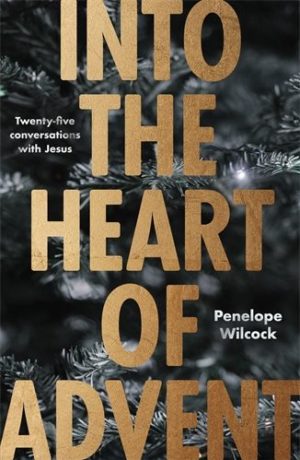



In your home, make a space for an Advent altar. This can be a small occasional table, a shelf or windowsill — something that will catch your eye and remind your heart of the word of God to us in this time of year. Each week we will add something to our altar.
For this first study, put on your altar a packet of seeds (or a pine cone; or seeds, dropped from the trees or garden flowers). On a small piece of paper alongside, write “The heart of winter carries the hope of summer at its heart”.
In her book Into the Heart of Advent, Penelope Wilcock takes us on a journey through the themes of Advent by a series of imagined conversations with Jesus.
Advent is one of the two great fasts in the life of the Church (the other is Lent), when we prepare ourselves spiritually for the two high points of the year — the feast of the Incarnation at Christmas, and the feast of the Resurrection at Easter.
The old, pre-Christian Celtic year followed the agricultural round of the seasons, governed by the waxing and waning of the light. When the British Isles were evangelised from the monastery at Iona, the monks worked with the existing religious observances, baptising them with new meaning as they settled the new Christian feasts alongside, usually one or two days after the old celebration.
In the old Celtic religion, the year concludes with Samhain, a time to remember what is passing and salute the reality of death, and remember the dead. Beside this festival the monks settled All Saints and All Souls, to illuminate the old ways with the light of the gospel. Before the beginning of the new Celtic year came the period of No Time, when the year waited in a state of silence and stillness. Yul — a word meaning ‘the turn’ — followed at the winter solstice, to mark the nascence of returning light. So the missionaries settled the feast of the Incarnation, when we celebrate the birth of the infant Light, alongside the festival of Yul.
Advent, therefore, corresponds most closely to the period of No Time; a space between things after the dying of the old year and before the birth of the infant light. It offers a space for reflection, a time of waiting in stillness, possessing our souls in patience as we make the descent into cold and dark. It’s a time to think and dream, and has also a quality of excitement and hope, as we look forward with longing to the light return. Advent is a time of waiting.
In our liturgies through Advent we think of the people of God, the prophets who foretell the birth of the Messiah, John the herald who goes before the Lord, and Mary who bears the Christchild hidden in her womb. This cast of characters is all about hope, longing and faith, about bearing the hidden light deep within us until its time comes to appear.
Part of this theme of waiting is the sense of impermanence — that where we are here and now is only transitionary, and derives its meaning from a destination as yet unrevealed, towards which we are travelling. So Advent encompasses the balancing biblical themes of exodus and exile — that here we have no abiding city because heaven is our home. We are both exiled from our homeland during our stay on earth, and led out in hope from the imprisonment of the flesh (with all its limitations) to the fulfilment and liberation of the Spirit.
Here are two biblical texts that touch upon this experience of yearning and longing, of waiting for the fulfilment of our faith, of the certain hope that illuminates our hearts waiting in darkness:
For this world is not our permanent home; we are looking forward to a home yet to come.
Hebrews 13:14 NLT
Let us pass through your country. We will stay on the main road; we will not turn aside to the right or to the left. Sell us food to eat and water to drink for their price in silver. Only let us pass through on foot until we cross the Jordan into the land the Lord our God is giving us.
Deuteronomy 2:27-28,29b NIVUK
Into the Heart of Advent explores the theme of waiting and of the homeward journey, especially in chapters 2, 11, 19, 20, 24 — as follows:
Ch. 2, Expectancy and Expectations, contrasts the excitement of expectancy in anticipating a birth with the oppression of expectations that can constrict our enjoyment of life.
Ch. 11, Frost, explores the themes of exodus and exile, touching upon the longing of refugees to come home.
Ch. 19, Homelessness, explores the vulnerability of impermanence and of human frailty, and proposes that the work of humanity is to see one another safely home.
Ch. 20, Shepherds, thinks about finding the courage to leave home and learning the way home again — the lessons we learn as we adventure and return to ourselves, coming to understand who and what we really are.
Ch.24, Be here now, reflects on the experience of the choristers of Kings College Chapel in the annual BBC broadcast of Carols from Kings on Christmas Eve. Each year, one of them will be chosen to start the service with a solo verse; but all of them must prepare to sing, because until the last moment none of them knows which one will be chosen as the soloist.
Reading these chapters in advance may help your home group prepare.
Lord Jesus, in this cold and dark time of the year, when the seeds sleep in the quiet earth and the nights are long, help us to believe in light and new life even though it is not yet apparent. Bless our unfinished work, our unresolved questions, our conflicted faith, our troubled relationships, our apprehension for the Earth’s future. Bless all this, and our muddled and vulnerable selves as we try to make sense of it all. Walk with us as master and friend, that our path through this world — with all its uncertainty and disappointment — may be blessed, may be holy, may be full of hope. Amen.